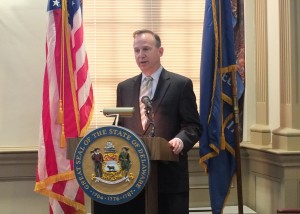Wilmington – A massive recruitment effort is now underway to fill 30 positions for Behavioral Health Consultants (BHCs) in middle schools statewide. The Department of Services for Children, Youth and Their Families (DSCYF) through its Division of Prevention and Behavioral Health Services (PBHS), has issued a Request for Proposal (RFP) to fill these positions in response to funding made available by the General Assembly through Governor Jack Markell’s budget initiatives to expand access to mental health services for children.
“We owe it to our youth to ensure they have access to the services they need to get the most out of their school experience,” said Governor Markell. “The work of our Behavioral Health Consultants is vital to our mission of giving every Delawarean the best chance to reach their potential. These specialists will fill a critical gap in services and provide help to children at a vulnerable time in their young lives.”
While many Delaware elementary schools have Family Crisis Therapists and high schools have Wellness Centers where children can access help, middle schools have lacked similar supports. In his State of the State, Markell emphasized the “huge gap in our care for adolescents” and asked the General Assembly to help him address this need. The budget funded his proposed ten-fold increase in the number of trained, front line mental health personnel in our middle schools.
BHCs are highly trained and licensed mental health professionals. They provide suicide risk assessments, substance abuse and trauma screening, short-term individual and family counseling, training and consultation for parents, teachers and administrators, and referrals to longer term treatment in the community. As part of the RFP, PBHS is also looking for a Contract Manager to oversee the program along with three County Coordinators. Applications are due by September 12th.
Lt. Governor Matt Denn worked with the Governor and DSCYF to champion this initiative which will place at least one BHC in every school district in Delaware. “Every step we take brings us closer to helping students in need, so I am hopeful that the RFP process brings us quality candidates who can get into schools quickly in order to start making a difference,” said Lt. Governor Denn.
A Delaware Youth Risk Behavior Survey revealed the need for middle school students’ access to mental health services through the following data: Over 20% of Middle school students reported having seriously considered suicide at some point in their life; 33% reported using alcohol; 14% reported having used drugs.
DSCYF Secretary Jennifer Ranji says, “The pre-teen, years can be very challenging for our young people. Negative behaviors that stem from an inability to cope with those challenges can result in family stress and suspension or expulsion from school – changes that can impact a child for a lifetime. The BHCs will help us identify at risk children earlier than before, so that we can provide appropriate interventions, and improve the number of positive and successful outcomes for these youth”.
The RFP and application instructions can be found on the DSCYF website at www.kids.delaware.gov, or the State bid website at www.bids.delaware.gov under the title of Behavioral Health Services. Questions should be directed to H. Ryan Bolles, DSCYF Procurement Administrator, at herbert.bolles@delaware.gov or (302) 633-2701.
The Children’s Department provides services to children who have been abused, neglected, are dependent, have mental health or substance problems, have been adjudicated delinquent by the Courts, as well as prevention services targeted toward all youth. For more information, please visit www.kids.delaware.gov.
